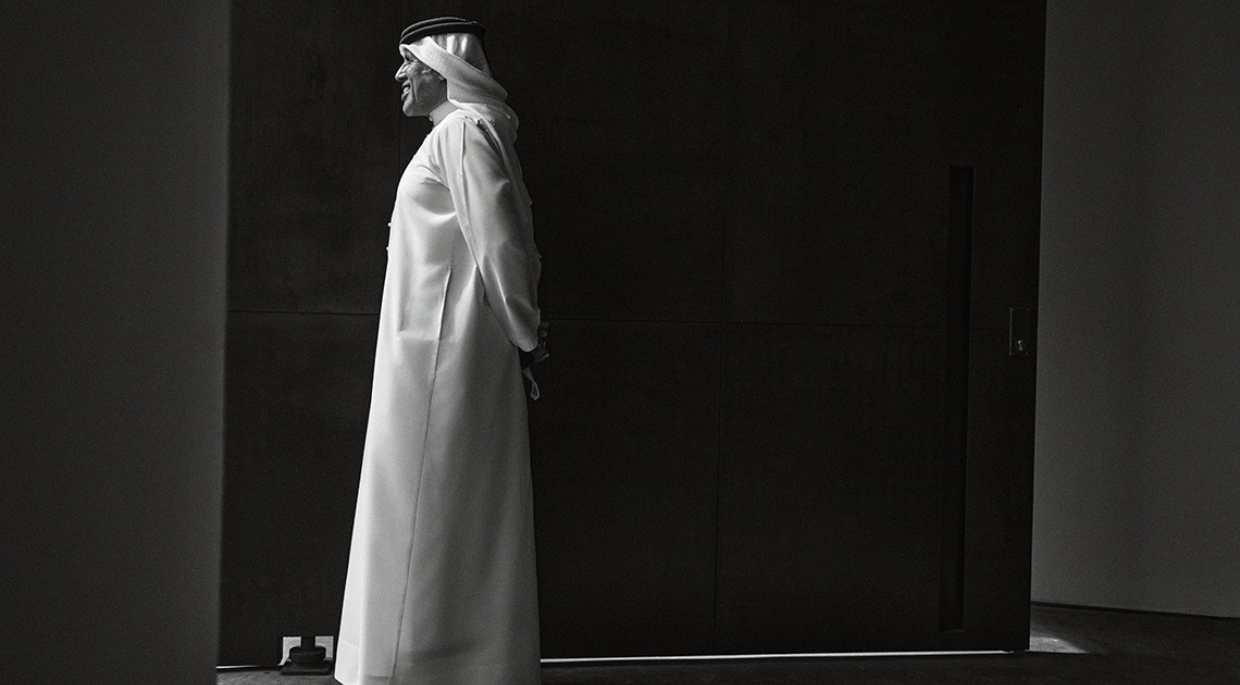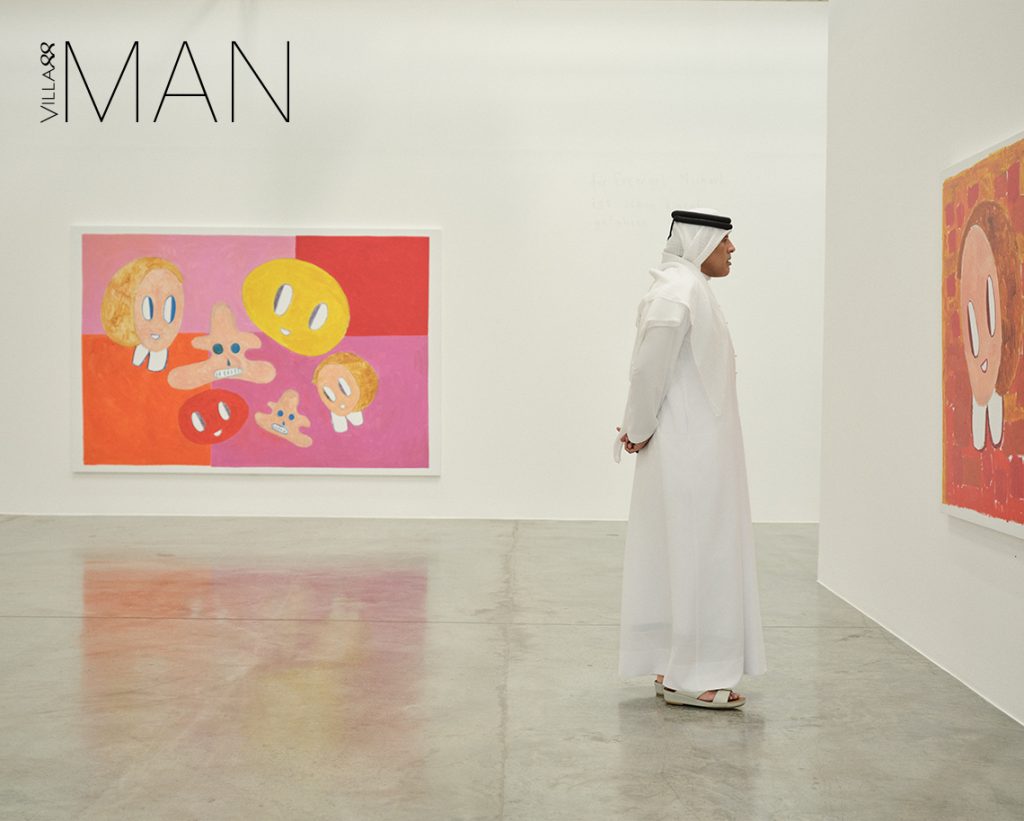
The first thing you notice about Abdelmonem Bin Eisa Alserkal is his warm and inviting smile. It’s not a timid or self-conscious expression, but rather one of the ear-to-ear variety that instantly lights up his face and puts you at ease. The second thing you notice is just how often he is beaming. His eyes dance and crinkle with well-earned laugh lines as he shares jokes or pays compliments to the people around him. This is a man who radiates confidence, relaxed certitude, and an overarching generosity of spirit.
And why wouldn’t Abdelmonem be in good spirits? Here is a man who, as we walk together from one art gallery, independent clothing store, or pop-up food truck to another at Alserkal Avenue, can see laid out in front of him the manifestation of his lifelong dream. A dream to make the UAE – and Dubai, specifically – the epicentre of artistic expression.
“From the very beginning, I was drawn to the idea of cultural enterprise,” he explains as we walk down the busy streets of the artistic microcosm he has created. “I was privileged to see the emergence of cultural districts the world over and to witness firsthand the positive impacts they had on the social and economic fabric of the societies in which they existed. I wanted to see such a space brought to life in Dubai, to encourage discourse and dialogue, to allow the creative spirit of the city’s multicultural communities to excel, promoting a sense of belonging and identity amongst those who call Dubai home.”

Abdelmonem recounts how one notable trip to California, when he was a young man, was particularly pivotal in planting the seeds of what would later become Alserkal Avenue. Visiting San Francisco, he remembers being struck by how, in an industrial area of the city, an old shipping container had been transformed into a storefront. This was a way of creating something useful and beautiful out of an object that, up until then, he had only seen as having a purely utilitarian function.
In 2007, he took this concept of seeing the potential in even the most prosaic as a starting point and opened Alserkal Avenue in the industrial area of Al Quoz in Dubai. Initially, he built it on the site of a former marble factory owned by the Alserkal family. “My goal was to create a space for those willing to reimagine their industries, where we could support the risk-takers and enable them to make a success out of their ideas,” recounts the Emirati businessman.

From those humble beginnings, the idea took root. Over the following 17 years, Alserkal Avenue would expand and grow into a vibrant cultural district, spanning over 44,500 square metres and 90 warehouses. Each of them teems with creativity being expressed in a multitude of ways. From the retro cool of Cinema Akil (a beloved bastion for art house films), to the recently opened gourmet chocolate shop Ganache Chocolatier and the 780-square-metre showroom designed by Roar for the renowned Jaipur Rugs company, the complex is an oasis of innovative ideas.
That said, it’s the array of art galleries that is the backbone of Alserkal Avenue. As Abdelmonem pops into gallery Carbon12, the staff warmly greet him and he is pleasantly surprised to see that the artist Philip Mueller, is there as well. The two men clasp hands and share a moment with the artwork of André Butzer which is currently on display before we continue our exploration of Alserkal Avenue.

On that same opportune trip to California, Abdelmonem relates how he happened upon the Ansel Adams Gallery when visiting Yosemite Valley. There, he discovered the photographer’s seminal Moonrise, Hernandez, New Mexico. Its stark beauty left a lasting impression on Abdelmonem and helped him understand just how expansive and important artistic expression can be. It showed him that art is a fundamental element of any civilisation or culture that wants to thrive and expand beyond its borders.
It is perhaps for this reason that Abdelmonem first founded the Alserkal Arts Foundation and launched, in 2017, the Alserkal Residency Programme. “These residencies are unique because they are non-production residencies,” he shares. “That means artists are not expected to create a work at the end of the cycle. Rather, it is a moment for them to further their research, to reflect, and to engage with our audiences and community to share and critique.”
To date, the initiative has enabled over 20 public art commissions, nine residency cycles, and has welcomed more than 20 residents. Abdelmonem sees it as a way for his family to strengthen arts research and production in the region.

Anyone who knows the Alserkal name also knows that this is a family with a long line of pioneering thinkers motivated by community building. Abdelmonem’s grandfather brought the first car to Dubai, as well as the first generator and water pumps for irrigation to the Emirates. He was also instrumental in starting the UAE’s first telecommunication firm, Dubai State Telephone Company Limited.
“We had a close relationship,” reflects Abdelmonem about his grandfather. “As a family, we would sit together at the lunch table every day listening to the radio. I remember Egyptian singer Umm Kulthum would be playing between 1pm and 2pm, and then at 2pm the news came on. This was a daily ritual in our family and a tradition that has continued until today – our doors are open to guests, business associates, and friends new and old, to join us and share a meal together.”
This open-door policy arguably has a physical manifestation at Alserkal Avenue as well, in the form of Concrete. The building sits in the heart of the district and acts as a backstop to the main open space of the complex called the Yard. It is a multi-purpose 600-square-metre cube-shaped venue designed with massive movable walls that make it possible to connect the indoor and outdoor spaces in a natural, organic, yet still dramatic way. It’s easy to recognise the style of architect Rem Koolhass’ practice OMA in the lines of Concrete. In fact, it was the first project OMA ever completed in the UAE and was famously shortlisted for the 2019 Aga Khan Award for Architecture.

“A thriving cultural scene is the backbone of integrated societies, engendering a sense of belonging and prosperity,” says Abdelmonem. “My vision has always been not only to help create the infrastructure within which the arts and culture sector can thrive, but to also ensure that, as we make strides in growing the impact of arts and culture, we remain mindful of our relationship with the environment and the legacy we are building for generations to come.”
To that end, Alserkal Avenue has been purposeful in its efforts to be environmentally friendly and sustainable. The complex uses solar panels and has electric vehicle charging stations. It has also evolved its thinking when it comes to adding elements of nature into the industrial space. For example, it recently changed the look of the Yard in front of Concrete. Abdelmonem collaborated with Zain Masud and architects T-Saki to create the urban landscaping, which features native and heirloom plants that consume far less water than the previous patch of grass that occupied the space.

Abdelmonem’s artistic ideas might be grounded in the work he does at Alserkal Avenue, but his creative vision extends well beyond it. At Alserkal, he explains, “We are not only thinking about our responsibility in the present, but we are constantly thinking of our impact on the future. Increasingly, Alserkal is less solely about the built environment of Alserkal Avenue. For example, Alserkal Advisory is already an expansion: we have used our lived expertise to help advise our clients in both the public and private sectors. And Alserkal Initiatives, which is a kind of ‘halo’ brand for all the other entities, is committed to reframing narratives about complex, interrelated geographies and creative production, providing opportunities and platforms for practitioners to experiment and engage with diverse audiences.”
As a longtime patron of the arts, Abdelmonem sees his work as an extension of the values and traditions he was taught as a child. “I have always been inspired by the patronage of my father and the Alserkal family. Growing up, it was a normal practice to want to give back, whether to the immediate community or the broader cultural landscape,” he explains.

This is perhaps one reason why his love of the arts has him sharing his knowledge on an international level as well. Since he founded Alserkal Avenue, Abdelmonem has fostered a closely knit network of international institutional partners and practitioners he collaborates with regularly. He also serves on the boards of numerous art institutions around the world. These include the British Museum’s Contemporary and Modern Middle Eastern Art Acquisition Group; the Tate’s Middle East and North Africa Acquisition Committee; and the Guggenheim’s Middle Eastern Circle.
According to the Alserkal Avenue website, Abdelmonem is also a Supporter of the Centre Pompidou International Circle – Middle East, a patron of the Peggy Guggenheim Collection, a member of Art Dubai’s Board of Patrons, and an honorary member of the Thinkers & Doers Forum, Paris. He has been awarded the UAE Patron of the Arts award – twice, and the French Ministry of Culture named Abdelmonem a chevalier of France’s L’ordre des Arts et des Lettres, a prestigious honour given to people who have distinguished themselves for their continuous contributions to the arts.

Today, besides his extensive duties at Alserkal Avenue, Abdelmonem is also the managing director of Nasser Bin Abdullatif Alserkal Est., and serves as a member of the board of the Alserkal Group. Furthermore, he sits on the boards of some of the UAE’s foundational businesses, including Emirates Telecommunications Group Company PJSC (Etisalat), and contributes in an advisory capacity to numerous other concerns such as the Tharawat Family Business Forum.
But none of that comes to mind while sitting across from Abdelmonem at Ganache, eating some of his favourite mango-filled chocolates to finish off our tour of Alserkal Avenue on a sweet note. Instead, it’s the sense that this is a man who has found a way to build a successful career by following his passion. A passion that has benefited countless artists, inspired individuals and helped make Dubai a haven for the arts in the Middle East. Or, as Abdelmonem so eloquently puts it, “I believe in the power of arts and culture to create bridges and build an understanding of the world around us.”
_____
Photographer: Žiga Mihelčič
Stylist: Daniel Stapel
Videographer: Alexander Suhorucov